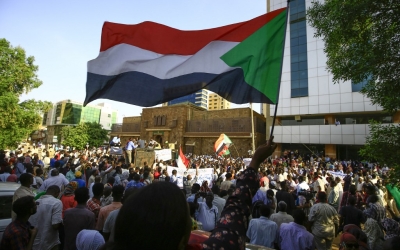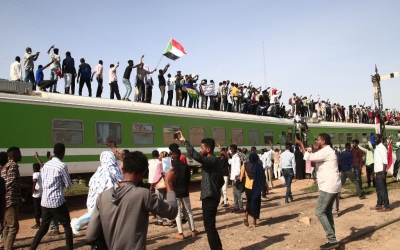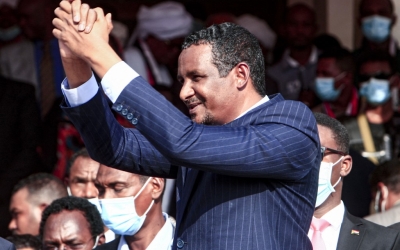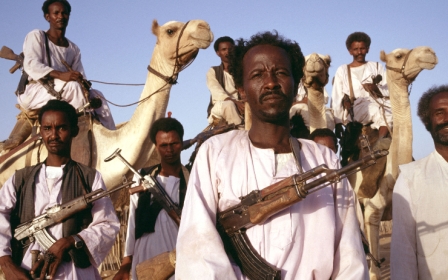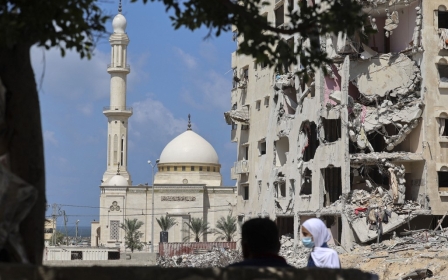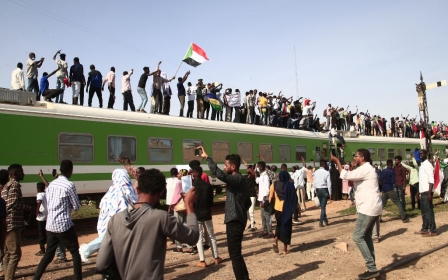Sudan: Deadly raids on 'terrorist cells' prompt calls for end of military rule
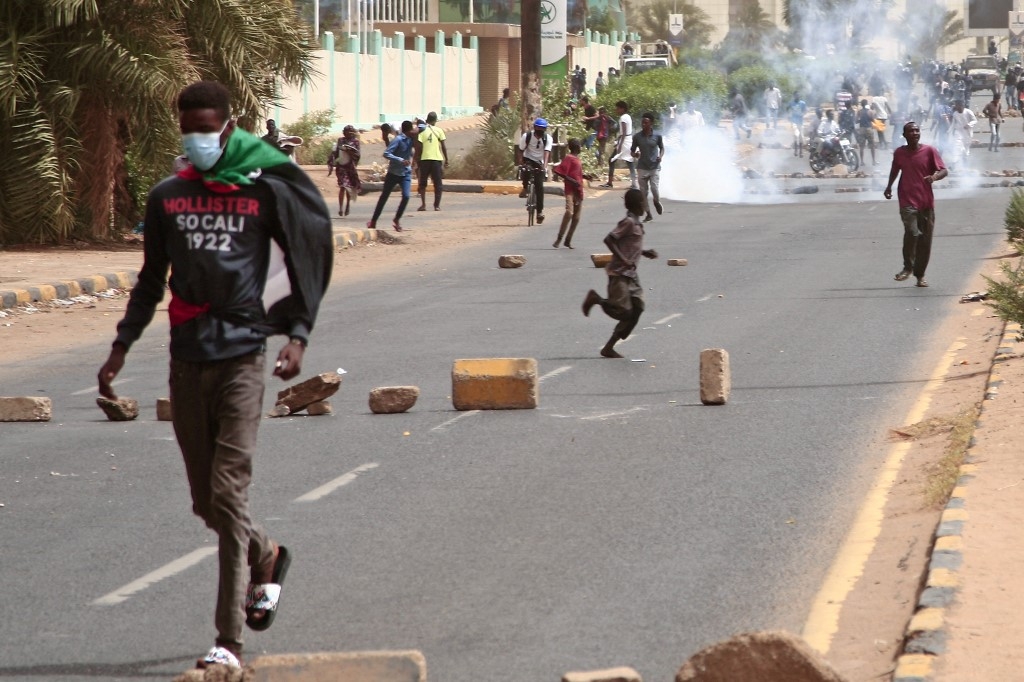
Residents of Sudan’s capital Khartoum have been shocked by the rare sight of clashes between security forces and militants, described by state media as “a terrorist cell”, during the past month.
Sudanese security forces have been engagesd in clashes with an alleged Islamic State-linked group in the capital Khartoum since 28 September, when five Sudanese officers were killed.
According to the intelligence services, 11 “foreign terrorists” from different nationalities were arrested in the raids.
'We saw some of them and others from the security forces killing each other. I will never forget this scene. It was full of blood, ambulances, security forces, and the sound of gunfire around us,'
- Muna Ahmed
On 3 October, security forces captured eight other “foreign elements” in a raid in the city of Omdurman, and a day later another raid led to the death of four suspected IS-linked militants and one member of the security forces in Khartoum’s Jabra district, according to the state news agency SUNA.
During the latest raid, security forces clashed with militants in two sites, and arrested four of them. The head of the Sudanese ruling Sovereign Council Abdel Fattah al-Burhan visited the site of the clashes.
New MEE newsletter: Jerusalem Dispatch
Sign up to get the latest insights and analysis on Israel-Palestine, alongside Turkey Unpacked and other MEE newsletters
Residents of Jabra and other neighbourhoods in the southern parts of the capital Khartoum who spoke to MEE have described “bloody” clashes in residential areas with “foreign-looking” men.
“I saw bearded foreign-looking men around the health centre in Jabra area a few days before the clashes took place,” Muna Ahmed, a resident of Jabra said.
“I witnessed the clashes between the joint security, police and army special forces and the terrorists,” Ahmed told MEE, adding that she saw the militants using the roofs of buildings to launch attacks on security forces.
“They took the civilians in the buildings nearby as hostages for many hours, which initially made it difficult to enter the building and arrest them,” she added.
“These were really scary moments. We saw some of them and others from the security forces killing each other. I will never forget this scene. It was full of blood, ambulances, security forces, and the sound of gunfire around us,” she added.
Ahmed Sati, another resident of Jabra, told MEE that he saw the same men in the neighbourhood before the raids. He describes them as Arabs from Egypt, Iraq, Syria and Palestine. But MEE could not independently verify that claim.
He added that the men had introduced themselves in the area as students, and others had been working in local restaurants and shops.
A security source told MEE that tracking the “terror cells” is still underway in different parts of Khartoum and other states like Port Sudan, Kassala and Sennar, adding that the current clashes may not be the end of the confrontation between the two sides.
“Sudan has been engaged in wide battles with these groups for a long time, and we will continue this war on terrorism because we don’t want those people to stay in our country,” the source said, speaking on condition of anonymity because he is not authorised to talk to the press.
“We will clear our country from them.”
Military-civilian dispute
The rare clashes have raised questions on why they took place at this time, and the security and political contexts behind them.
In July, Port Sudan was rocked by a terror attack that killed a number of civilians. Meanwhile, the investigation into the failed assassination attempt against Prime Minister Abdullah Hamdok is still ongoing, despite the participation of US FBI investigators in the probe.
The clashes also coincide with a political crisis exacerbated in recent weeks by an alleged coup attempt and a war of words between the civilian and military rulers of the country.
Since longtime autocrat Omar al-Bashir was removed from office in April 2019 following months of protests against his rule, Sudan has been ruled by the hybrid civilian-military Sovereign Council, formed by the Transitional Military Council and the Forces of Freedom and Change (FFC), based on an agreement on a 39-month transitional period.
The dispute between military and civilian leaders has pushed international guarantors of the power-sharing deal between the civilians and military to rush to Sudan and mediate between the two sides.
Meanwhile, security forces fired tear gas on an estimated 20,000 people who took to the streets in protests last week in support of a civilian-led transition to democracy.
Calls for civilian rule
The recent “terrorist attacks” and raids on “terrorist cells” have prompted calls to bring the intelligence apparatus under civilian control.
The civilian component of the ruling council, the FFC, issued a statement demanding reforms in the military as a means of dealing with the current unrest.
“The terrorist attacks come in conjunction with political destabilisation in the country and the threat of a military coup last month, amid wide tribal clashes in different parts of the country and closure of the ports by protesters in Eastern Sudan, which has caused interruptions in the supply of basic commodities to the rest of the country including flour, medicines, fuel and others,” the FFC statement read.
'The military is fearful of its role in a future Sudan. But creating security threats that they alone can resolve is not going to convince people that the military should remain in charge,'
- Cameroon Hudson, Atlantic Council
“This proves that the demand of security and military reform is a key point for the stability of the country,” the statement added.
However, Sudanese security analyst Saeed Alatabani believes that the interventions of civilians in the military and security issues after the revolution is one of the main reasons for the security vacuum in the country.
“The occurrence of two terrorist incidents within one week is highly alarming, especially when Sudan is facing a fragile security situation,” he said. “Civilians have to stop their interventions in these sensitive files and enable the intelligence to deal with it properly and professionally,” he told MEE.
Cameron Hudson, a former US diplomat in charge of Sudan and a fellow at the Atlantic Council thinktank, suggested the military needs to renounce power so the country will be able to face its ongoing security threats.
“The military is fearful of its role in a future Sudan. But creating security threats that they alone can resolve is not going to convince people that the military should remain in charge,” he said.
“People are genuinely tired of these games from the military. The more they engage in this type of behaviour the more they embarrass themselves in the eyes of the people. What is more important to them, power or credibility? At this point, they cannot gain credibility without giving up some power,” he argued.
He added that the timing of the government’s action against the alleged IS network in the country is “a good reminder to the public and military supporters that Sudan faces many threats, foreign and domestic and the country cannot afford to have a strong military-security apparatus leading the country”.
Sudan ‘up for grabs’
The recent rise in "terrorist" activity comes a few months after the removal of Sudan from the US list of State Sponsors of Terror, a step that has opened narrow chances for the country to recover or drop its $60bn debts and attract foreign investments.
It also comes after reports that Sudan’s government has confiscated assets belonging to the Palestinian movement Hamas, which had previously been allowed in the country under Bashir’s rule.
Hudson argues that there are regional powers who are working against democratisation in Sudan and want to bring the country to their side.
“The terrorist facilitation network has been active in Sudan for years. This fact is well established and has been the subject of ongoing counterterrorism cooperation with the United States,” he said.
“Sudan is up for grabs right now and forces around the world are working hard to try to move it into their camp. Just as the US and its partners are trying to move Sudan into the democratic camp, there are more malign forces trying to undermine the transition and ensure that Sudan remains a compliant security state,” he added.
Middle East Eye delivers independent and unrivalled coverage and analysis of the Middle East, North Africa and beyond. To learn more about republishing this content and the associated fees, please fill out this form. More about MEE can be found here.


